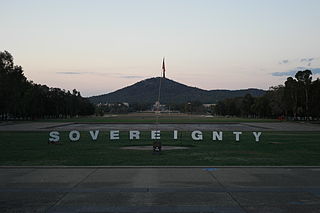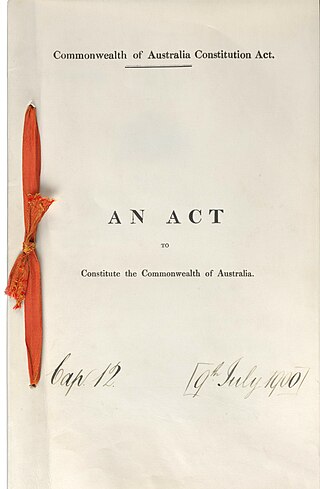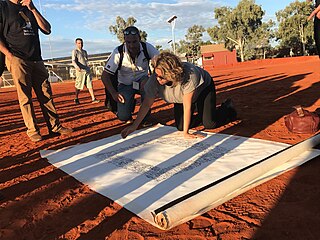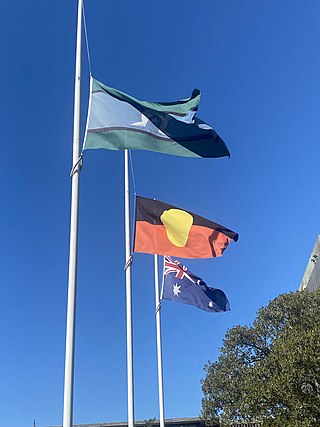
Australian Indigenous sovereignty, also recently termed Blak sovereignty, encompasses the various rights claimed by Aboriginal and Torres Strait Islander peoples within Australia. Such rights are said to derive from Indigenous peoples' occupation and ownership of Australia prior to colonisation and through their continuing spiritual connection to land. Indigenous sovereignty is not recognised in the Australian Constitution or under Australian law.

The second question of the 1967 Australian referendum of 27 May 1967, called by the Holt government, related to Indigenous Australians. Voters were asked whether to give the Commonwealth Parliament the power to make special laws for Indigenous Australians in states, and whether Indigenous Australians should be included in official population counts for constitutional purposes. The term "the Aboriginal Race" was used in the question.
Reconciliation Australia is a non-government, not-for-profit foundation established in January 2001 to promote a continuing national focus for reconciliation between Indigenous and non-Indigenous Australians. It was established by the Council for Aboriginal Reconciliation, which was established to create a framework for furthering a government policy of reconciliation in Australia.
Section 51(xxvi) of the Constitution of Australia, commonly called "the race power", is the subsection of Section 51 of the Constitution of Australia granting the Australian Commonwealth the power to make special laws for people of any race.

Marcia Lynne Langton is an Aboriginal Australian writer and academic. As of 2022 she is the Redmond Barry Distinguished Professor at the Melbourne School of Population and Global Health, University of Melbourne. Langton is known for her activism in the Indigenous rights arena.
Indigenous Australian self-determination, also known as Aboriginal Australian self-determination, is the power relating to self-governance by Aboriginal and Torres Strait Islander peoples in Australia. It is the right of Aboriginal and Torres Strait Islander peoples to determine their own political status and pursue their own economic, social and cultural interests. Self-determination asserts that Aboriginal and Torres Strait Islander peoples should direct and implement Aboriginal and Torres Strait Islander policy formulation and provision of services. Self-determination encompasses both Aboriginal land rights and self-governance, and may also be supported by a treaty between a government and an Indigenous group in Australia.
Indigenous Australians are people with familial heritage from, and/or recognised membership of, the various ethnic groups living within the territory of present day Australia prior to British colonisation. They consist of two distinct groups, which includes many ethnic groups: the Aboriginal Australians of the mainland and many islands, including Tasmania, and the Torres Strait Islanders of the seas between Queensland and Papua New Guinea, located in Melanesia. The term Aboriginal and Torres Strait Islander peoples or the person's specific cultural group, is often preferred, though the terms First Nations of Australia, First Peoples of Australia and First Australians are also increasingly common; 812,728 people self-identified as being of Aboriginal and/or Torres Strait Islander origin in the 2021 Australian Census, representing 3.2% of the total population of Australia. Of these Indigenous Australians, 91.4% identified as Aboriginal; 4.2% identified as Torres Strait Islander; while 4.4% identified with both groups. Since 1995, the Australian Aboriginal flag and the Torres Strait Islander flag have been official flags of Australia.

The Constitution of Australia is the fundamental law that governs the political structure of Australia. It is a written constitution, that establishes the country as a federation under a constitutional monarchy governed with a parliamentary system. Its eight chapters sets down the structure and powers of the three constituent parts of the federal level of government: the Parliament, the Executive Government and the Judicature.
Section 25 of the Constitution of Australia is a provision of the Constitution of Australia headed "Provision as to races disqualified from voting" and providing that "For the purposes of the last section, if by the law of any State all persons of any race are disqualified from voting at elections for the more numerous House of the Parliament of the State, then, in reckoning the number of the people of the State or of the Commonwealth, persons of that race resident in that State shall not be counted."

The Uluru Statement from the Heart is a 2017 petition to the people of Australia, written and endorsed by the Australian Aboriginal and Torres Strait Islander leaders selected as delegates to the First Nations National Constitutional Convention. The document calls for substantive constitutional change and structural reform through the creation of two new institutions; a constitutionally protected First Nations Voice and a Makarrata Commission, to oversee agreement-making and truth-telling between governments and First Nations. Such reforms should be implemented, it is argued, both in recognition of the continuing sovereignty of Indigenous peoples and to address structural power differences that has led to severe disparities between Indigenous and non-Indigenous Australians. These reforms can be summarised as Voice, Treaty and Truth.
Indigenous treaties in Australia are proposed binding legal agreements between Australian governments and Australian First Nations. A treaty could recognise First Nations as distinct political communities, acknowledge Indigenous Sovereignty, set out mutually recognised rights and responsibilities or provide for some degree of self-government. As of 2023, no such treaties are in force, however the Commonwealth and all states except Western Australia have expressed support previously for a treaty process. However, the defeat of the Voice referendum has led to a reversal by several state liberal and national parties in their support for treaty and a much more ambigious expressed position by state Labor parties and governments.
Aboriginal Australian identity, sometimes known as Aboriginality, is the perception of oneself as Aboriginal Australian, or the recognition by others of that identity. Aboriginal Australians are one of two Indigenous Australian groups of peoples, the other being Torres Strait Islanders. There has also been discussion about the use of "Indigenous" vs "Aboriginal", or more specific group names, such as Murri or Noongar (demonyms), Kaurna or Yolngu, based on language, or a clan name. Usually preference of the person(s) in question is used, if known.

The Aboriginal and Torres Strait Islander Voice, also known as the Indigenous Voice to Parliament, the First Nations Voice or simply the Voice, was a proposed Australian federal advisory body to comprise Aboriginal and Torres Strait Islander people, to represent the views of Indigenous communities.

Reconciliation in Australia is a process which officially began in 1991, focused on the improvement of relations between the Aboriginal and Torres Strait Islander peoples of Australia and the rest of the population. The Council for Aboriginal Reconciliation (CAR), created by the government for a term of ten years, laid the foundations for the process, and created the peak body for implementation of reconciliation as a government policy, Reconciliation Australia, in 2001.

The 2023 Australian Indigenous Voice referendum was a constitutional referendum held on 14 October 2023 in which the proposed Aboriginal and Torres Strait Islander Voice was rejected. Voters were asked to approve an alteration to the Australian Constitution that would recognise Indigenous Australians in the document through prescribing a body called the Aboriginal and Torres Strait Islander Voice that would have been able to "make representations to the Parliament and the Executive Government of the Commonwealth on matters relating to Aboriginal and Torres Strait Islander peoples". The proposal was rejected nationally and by a majority in every state, thus failing to secure the double majority required for amendment by section 128 of the constitution. The Australian Capital Territory was the only state or territory with a majority of "yes" votes.
Opinion polling on whether to change the Australian Constitution to establish an Indigenous Voice has been conducted since 2017, when Aboriginal and Torres Strait Islander leaders petitioned for such an amendment as part of the Uluru Statement from the Heart. The number of these polls conducted grew substantially following Labor's victory in the 2022 federal election; the party had committed to holding the referendum required for this constitutional change in its first term of government.
Many politicians, public figures, media outlets, businesses and other organisations endorsed voting either in favour or against the proposed Indigenous Voice to Parliament in the lead-up to the 2023 Australian Indigenous Voice referendum, which was held on 14 October.
Thomas Mayo is an Indigenous Australian Australian human rights advocate and author. He is a signatory and advocate of the Indigenous Voice to Parliament, and a trade union organiser.
Australian Indigenous advisory bodies are Aboriginal and Torres Strait Islander advisory bodies established or proposed to be established by the Commonwealth and state and territory governments. Calls for such bodies, especially for a Commonwealth level Voice to Parliament, became prominent following the release of the Uluru Statement from the Heart, however similar bodies of various levels of independence have existed since the official end of assimilationist policies in the 1970s and the promotion of self-determination and reconciliation. Such bodies generally advise governments on policies and programmes that affect Indigenous Australians, and represent Indigenous interests in public debate. Other advisory bodies have been established in the context of state treaty process, to advise governments and Indigenous groups to prepare for upcoming negotiations.







